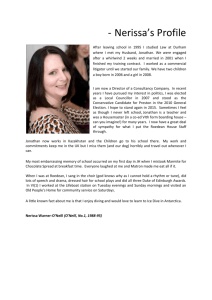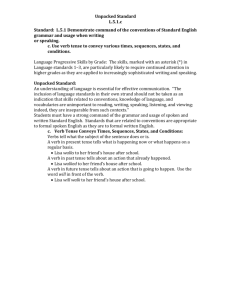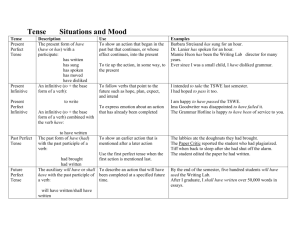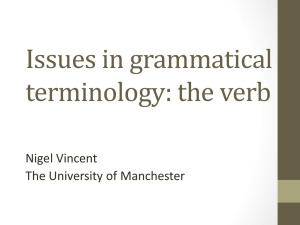How Much Land Does a Man Need?
advertisement
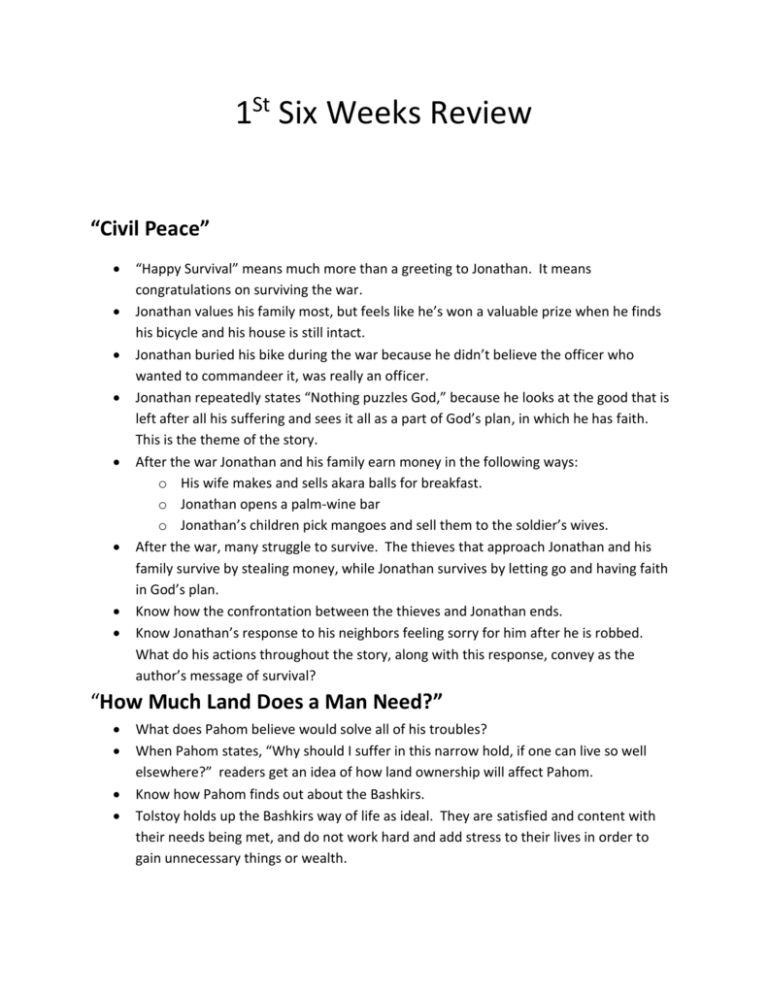
1St Six Weeks Review “Civil Peace” “Happy Survival” means much more than a greeting to Jonathan. It means congratulations on surviving the war. Jonathan values his family most, but feels like he’s won a valuable prize when he finds his bicycle and his house is still intact. Jonathan buried his bike during the war because he didn’t believe the officer who wanted to commandeer it, was really an officer. Jonathan repeatedly states “Nothing puzzles God,” because he looks at the good that is left after all his suffering and sees it all as a part of God’s plan, in which he has faith. This is the theme of the story. After the war Jonathan and his family earn money in the following ways: o His wife makes and sells akara balls for breakfast. o Jonathan opens a palm-wine bar o Jonathan’s children pick mangoes and sell them to the soldier’s wives. After the war, many struggle to survive. The thieves that approach Jonathan and his family survive by stealing money, while Jonathan survives by letting go and having faith in God’s plan. Know how the confrontation between the thieves and Jonathan ends. Know Jonathan’s response to his neighbors feeling sorry for him after he is robbed. What do his actions throughout the story, along with this response, convey as the author’s message of survival? “How Much Land Does a Man Need?” What does Pahom believe would solve all of his troubles? When Pahom states, “Why should I suffer in this narrow hold, if one can live so well elsewhere?” readers get an idea of how land ownership will affect Pahom. Know how Pahom finds out about the Bashkirs. Tolstoy holds up the Bashkirs way of life as ideal. They are satisfied and content with their needs being met, and do not work hard and add stress to their lives in order to gain unnecessary things or wealth. When Pahom sees himself dead in his dream, readers get a clue to the theme of the story. Know the difference between wants and needs, and striving for too much can cause the loss of everything. Pahom’s wife states this early in the story when she tells her sister, “…though you often earn more than you need, you’re very likely to lose all you have.” What is Tolstoy’s answer to the question, “How Much Land Does a Man Need?” “The Street of the Canon” The stranger is drawn to the girl with “laughing black eyes,” because he has seen her before and wants to dance with her. When and under what circumstances? Sarita thinks the stranger is ignorant and unaware of the relationship between Hidalgo and San Juan Iglesias. How do readers know this fact? Both cities claim ownership of the bones of a famous historian. Explain each city’s reasoning as to why its people are the rightful owners of the bones. The stranger’s actions reveal him to be a bold character, who can manipulate people and situations. Sarita’s attitude as she describes Pepe’s reputation suggests admiration for his courage. Why does the stranger leave the party? Pepe crashes the party as another of his daring escapades. Vocabulary Commiserate Destitute Piqued Forbore Nonchalantly Imperiously Disreputable Amenable Aggrieved Discord Prostrate Grammar Subjunctive Mood: A verb is in the subjunctive mood when it expresses a condition which is doubtful or not factual. It is most often found in a clause beginning with the word if. It is also found in clauses following a verb that expresses a doubt, a wish, regret, request, demand, or proposal. In English there is no difference between the subjunctive and normal, or indicative, form of the verb except for the present tense third person singular and for the verb to be. The subjunctive mood of the verb to be is be in the present tense and were in the past tense, regardless of the subject being singular or plural. Incorrect: If I was you, I would run. Correct: If I were you, I would run. (The verb follows if and expresses a non-factual condition.) Incorrect: I wish he was able to type faster. Correct: I wish he were able to type faster. (The second verb is in a clause following a verb expressing a wish. It also suggests a non-factual or doubtful condition.) Incorrect: His requirement is that everyone is computer literate. Correct: His requirement is that everyone be computer literate. (Subordinate clause follows main clause with a demand.) Incorrect: He recommended that each driver reports his tips. Correct: He recommended that each driver report his tips. Incorrect: Jonathan knows that he needs to transfer the money to his left pocket. Correct: The thieves demand that Jonathan be willing to give them his money Incorrect: If Pahom was smart, he would be satisfied with less. Correct: If Pahom were smart, he would be satisfied with less. http://englishplus.com/grammar/00000031.htm Subject/Verb Agreement: singular be verb = was He was. plural be verb = were We were. present tense subjects require present tense verbs Let’s begin dancing now. past tense subjects require past tense verbs The chaperone allowed it, so they began to dance.
